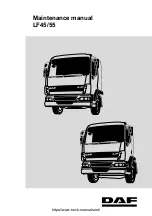
Greenhouse Gas Emissions
and Fuel Consumption
Standards
Vehicles and/or engines manufactured after Decem-
ber 31, 2006 and domiciled in the U.S. or Canada
are required to meet all EPA and NHTSA regulations
effective as of the vehicle build date. Engines manu-
factured between January 1, 2007 and December 31,
2009 meet EPA07 requirements. Engines manufac-
tured between January 1, 2010 and December 31,
2012 meet EPA10 requirements. Engines manufac-
tured from January 1, 2013 meet NHTSA and EPA
2014 fuel efficiency and greenhouse gas emission
standards (GHG14) requirements.
Model year 2013 and later vehicles meet additional
requirements as specified by GHG14 requirements.
These vehicles are equipped with components that
increase fuel efficiency and reduce GHG emissions.
Components may include, but are not limited to, low-
rolling resistance tires; aerodynamic devices such as
hood, cab/sleeper extenders, and fuel tank fairings;
vehicle speed limiter; and idle shutdown timer. If re-
placement of any drag-reducing component is re-
quired, the replacement component must meet or
exceed the drag reduction performance of the origi-
nally installed component in order to maintain compli-
ance with GHG14 requirements.
EPA-Regulated Emissions
Aftertreatment Systems
IMPORTANT: Depending on local jurisdictional
guidelines, vehicles that are domiciled outside of
the U.S. and Canada may not have emissions
aftertreatment systems (ATS) that are compliant
with EPA regulations.
NOTICE
Follow these guidelines for engines that comply
with EPA07 or newer regulations, or damage may
occur to the aftertreatment device (ATD) and the
warranty may be compromised.
•
Use ultralow-sulfur diesel with 15 ppm sul-
fur content or less.
•
Do not use fuel blended with used engine
lube oil or kerosene.
•
Engine lube oil must have a sulfated ash
level less than 1.0 wt %; currently referred
to as CJ-4 oil.
IMPORTANT: Using non-specification fuels or
oils can lead to shortened diesel particulate filter
(DPF) cleaning or replacement intervals. For
example, using CJ-4+ oil with 1.3% sulfated ash
(30% more ash content) may result in the need
for DPF cleaning or replacement 20 to 30%
sooner than would normally be required.
IMPORTANT: See the engine manufacturer’s
operation manual for complete details and op-
eration of the ATS.
EPA07 Engines
Engines built between January 1, 2007 and Decem-
ber 31, 2009 are required to meet EPA07 guidelines
for reduced exhaust emissions of particulate matter
and nitrogen oxides (NOx). NOx is limited to just
over 1 gram per brake horsepower hour (g/bhp-hr),
and particulate matter cannot exceed 0.01 g/bhp-hr.
The EPA07 ATS varies according to engine manufac-
turer and vehicle configuration, but the exhaust muf-
fler is replaced by an aftertreatment device (ATD).
Inside the ATD, the exhaust first passes over the die-
sel oxidation catalyst (DOC), then passes through
the diesel particulate filter (DPF), which traps soot
particles. The soot is burned to ash during a process
called regeneration (regen).
EPA10 and Newer Engines
The EPA mandates that all engines built after De-
cember 31, 2009 must reduce the level of emissions
exhausted by the engine to the following levels:
•
Nitrogen Oxides (NOx) – 0.2 g/bhp-hr
•
Particulate Matter (PM) – .01 g/bhp-hr
To meet EPA guidelines, engines that are compliant
with EPA10 and newer regulations use an ATS that
has, in addition to a DOC/DPF device like that used
in an EPA07 ATD, a Selective Catalytic Reduction
(SCR) device to reduce NOx downstream of the en-
gine. After exhaust gases leave the DPF, a controlled
quantity of diesel exhaust fluid (DEF) is injected into
the exhaust stream. In the presence of heat, DEF is
converted to ammonia gas, which reacts with NOx in
the selective catalyst chamber to yield nitrogen and
water vapor, which exit through the tailpipe.
Emissions and Fuel Efficient Components
12.1
Summary of Contents for cascadia
Page 1: ...Driver s Manual CASCADIA Part Number STI 478 Publication Number STI 478 6 ...
Page 106: ...9 Cab Features Windows 9 1 Mirrors 9 1 Cab Amenities 9 1 Sleeper Amenities 9 2 ...
Page 163: ...16 Drive Axles Differential Locks 16 1 Two Speed Drive Axles 16 2 ...
Page 167: ...17 Steering System Power Steering System General Information 17 1 Power Steering Systems 17 1 ...
Page 180: ...19 Trailer Couplings Air Suspension Dump Valve 19 1 Holland Trailer Coupling 19 1 ...
Page 229: ...26 Specifications Fuses and Relays 26 1 Replacement Bulbs 26 3 Fluids and Lubricants 26 4 ...











































